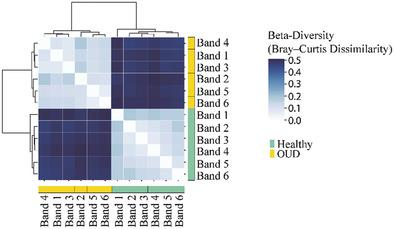当前位置:
X-MOL 学术
›
Adv. Healthcare Mater.
›
论文详情
Our official English website, www.x-mol.net, welcomes your
feedback! (Note: you will need to create a separate account there.)
Evolving Magnetically Levitated Plasma Proteins Detects Opioid Use Disorder as a Model Disease.
Advanced Healthcare Materials ( IF 10.0 ) Pub Date : 2020-01-29 , DOI: 10.1002/adhm.201901608 Ali Akbar Ashkarran 1 , Tina Olfatbakhsh 2 , Milad Ramezankhani 2 , Richard C Crist 3 , Wade H Berrettini 3 , Abbas S Milani 2 , Sepideh Pakpour 2 , Morteza Mahmoudi 1, 4
Advanced Healthcare Materials ( IF 10.0 ) Pub Date : 2020-01-29 , DOI: 10.1002/adhm.201901608 Ali Akbar Ashkarran 1 , Tina Olfatbakhsh 2 , Milad Ramezankhani 2 , Richard C Crist 3 , Wade H Berrettini 3 , Abbas S Milani 2 , Sepideh Pakpour 2 , Morteza Mahmoudi 1, 4
Affiliation

|
There are several methods (e.g., enzyme-linked immunosorbent assay and liquid chromatography mass spectroscopy) that already use human plasma to detect a variety of possible diseases. However, this paper introduces the capabilities of magnetic levitation (Maglev) to detect disease (Opioid Use Disorder, used here as a model disease) by using levitation of human plasma proteins. The presented proof-of-concept findings revealed that the optical images of magnetically levitated plasma proteins carry important information about the health spectrum of plasma donors. In addition, the liquid chromatography mass spectroscopy analysis of the magnetically levitated plasma proteins demonstrated remarkable differences between the plasma of healthy individuals and patients with opioid use disorders. Overall, the presented method provides diagnostic value for disease detection using optical images of evolving magnetically levitated plasma proteins and/or proteomic information.
中文翻译:

不断发展的磁悬浮血浆蛋白将阿片类药物使用障碍检测为模型疾病。
有几种方法(例如酶联免疫吸附测定和液相色谱质谱法)已经使用人血浆检测多种可能的疾病。但是,本文介绍了磁悬浮(Maglev)通过使用人体血浆蛋白的悬浮来检测疾病(阿片类药物使用障碍,此处用作模型疾病)的功能。提出的概念验证发现表明,磁悬浮血浆蛋白的光学图像带有有关血浆供体健康谱的重要信息。此外,磁悬浮血浆蛋白的液相色谱质谱分析表明,健康人血浆与阿片类药物使用障碍患者的血浆之间存在显着差异。总体,
更新日期:2020-03-04
中文翻译:

不断发展的磁悬浮血浆蛋白将阿片类药物使用障碍检测为模型疾病。
有几种方法(例如酶联免疫吸附测定和液相色谱质谱法)已经使用人血浆检测多种可能的疾病。但是,本文介绍了磁悬浮(Maglev)通过使用人体血浆蛋白的悬浮来检测疾病(阿片类药物使用障碍,此处用作模型疾病)的功能。提出的概念验证发现表明,磁悬浮血浆蛋白的光学图像带有有关血浆供体健康谱的重要信息。此外,磁悬浮血浆蛋白的液相色谱质谱分析表明,健康人血浆与阿片类药物使用障碍患者的血浆之间存在显着差异。总体,











































 京公网安备 11010802027423号
京公网安备 11010802027423号